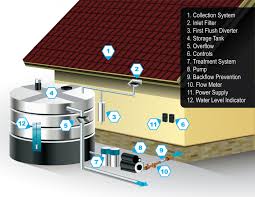The Importance of Rainwater Filters in Sustainable Water Management
Rainwater harvesting is a valuable practice that helps conserve water resources and reduce reliance on traditional water sources. However, it is essential to ensure that the collected rainwater is clean and safe for various uses. This is where rainwater filters play a crucial role in sustainable water management.
A rainwater filter is a device designed to remove debris, sediment, pollutants, and contaminants from rainwater before it is stored or used. By installing a rainwater filter system, you can improve the quality of harvested rainwater and make it suitable for applications such as irrigation, laundry, flushing toilets, and even drinking with proper treatment.
There are different types of rainwater filters available on the market, including mesh filters, cartridge filters, vortex filters, and UV filters. Each type has its own set of advantages and is suitable for specific filtration needs based on the source of contamination and intended use of the harvested rainwater.
Benefits of using rainwater filters include:
- Preventing clogging of storage tanks and distribution systems
- Removing pollutants such as leaves, twigs, bird droppings, and other debris
- Improving water quality for safe use in various applications
- Extending the lifespan of water storage systems
- Reducing maintenance requirements for rainwater harvesting systems
Incorporating a rainwater filter into your rainwater harvesting system is an effective way to ensure that you have access to clean and reliable water while promoting sustainable water management practices. By investing in quality filtration equipment and regular maintenance, you can maximize the benefits of using harvested rainwater for both residential and commercial purposes.
Remember that proper installation and maintenance of rainwater filters are essential to ensure optimal performance and efficiency. Consult with water management professionals or suppliers to determine the most suitable filter system for your specific needs and requirements.
Embrace the use of rainwater filters as part of your sustainable water management strategy to contribute to water conservation efforts and reduce your environmental impact. Together, we can make a difference in preserving precious water resources for future generations.
5 Essential Tips for Maintaining an Effective Rainwater Filtration System
- Regularly clean the rainwater filter to ensure proper functioning.
- Install a first flush diverter to divert the initial flow of dirty water away from the filter.
- Use a fine mesh or screen to prevent debris from entering the rainwater tank.
- Position the filter system in a way that allows easy access for maintenance and cleaning.
- Consider adding activated carbon or UV treatment for additional filtration if needed.
Regularly clean the rainwater filter to ensure proper functioning.
Regularly cleaning the rainwater filter is essential to maintain its proper functioning and effectiveness in removing debris and contaminants from harvested rainwater. By establishing a routine maintenance schedule for cleaning the filter, you can prevent clogging, improve water quality, and prolong the lifespan of your rainwater harvesting system. Neglecting to clean the filter can lead to reduced filtration efficiency and potential system malfunctions, compromising the quality of stored rainwater. Prioritizing regular maintenance tasks, such as cleaning the rainwater filter, is key to maximizing the benefits of using harvested rainwater for various purposes while promoting sustainable water management practices.
Install a first flush diverter to divert the initial flow of dirty water away from the filter.
Installing a first flush diverter is a smart tip to enhance the efficiency of your rainwater filter system. By diverting the initial flow of dirty water, typically containing debris and contaminants accumulated on the roof, away from the filter, you can prevent clogging and ensure that only cleaner rainwater reaches the filtration unit. This simple yet effective addition helps optimize the performance of your rainwater harvesting system and improves the quality of collected water for various uses.
Use a fine mesh or screen to prevent debris from entering the rainwater tank.
To enhance the effectiveness of your rainwater filter system, consider using a fine mesh or screen to prevent debris from entering the rainwater tank. By incorporating this simple yet crucial tip, you can significantly reduce the amount of contaminants and sediment that may compromise the quality of your harvested rainwater. A fine mesh or screen acts as a barrier, capturing leaves, twigs, insects, and other debris before they have a chance to accumulate in the tank. This proactive measure not only helps maintain water quality but also minimizes the risk of clogging and ensures smoother operation of your rainwater harvesting system.
Position the filter system in a way that allows easy access for maintenance and cleaning.
Positioning the rainwater filter system in a strategic location that enables easy access for maintenance and cleaning is a crucial tip to ensure the efficient operation of your rainwater harvesting setup. By placing the filter system in a convenient spot, you can regularly inspect and clean the filters, removing any accumulated debris or contaminants that may affect water quality. This proactive approach not only enhances the performance of the filtration system but also extends its lifespan, ultimately contributing to sustainable water management practices.
Consider adding activated carbon or UV treatment for additional filtration if needed.
Consider enhancing the effectiveness of your rainwater filter system by incorporating activated carbon or UV treatment for additional filtration, especially if you require higher purity levels for specific applications. Activated carbon can help remove organic compounds and odors, while UV treatment can effectively eliminate bacteria, viruses, and other pathogens, ensuring that your harvested rainwater meets the highest quality standards for a wide range of uses. By integrating these advanced filtration methods into your rainwater harvesting system, you can further enhance water quality and safety while promoting sustainable water management practices.

